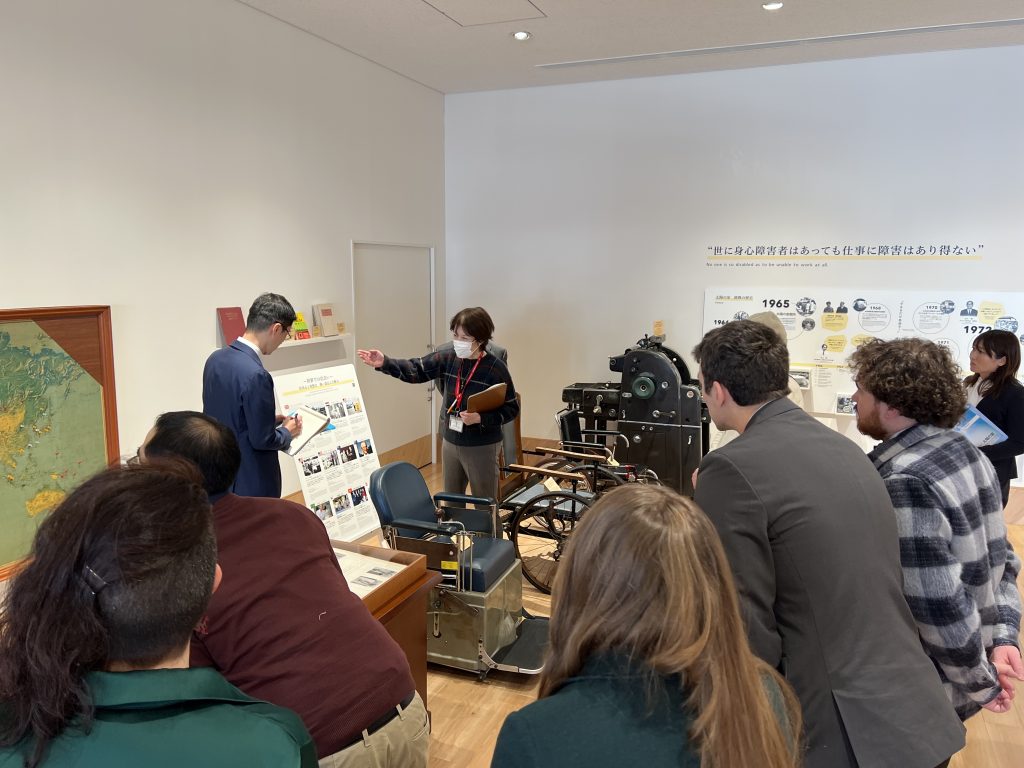
JSI tour during JST 2025 to Oita
Japan Sun Industries (JSI), also known as the House of the Sun, has been committed to creating employment opportunities for people with disabilities since 1965. Over the decades, it has helped many individuals reintegrate into society through meaningful work and vocational training. JSI fosters inclusivity and empowerment, partnering with corporations such as HEXEL Works to enhance workplace experiences for individuals with disabilities.
Local authorities in Oita, where JSI is based, play a crucial role in supporting its mission. They provide financial and logistical support, including subsidies and grants, and advocate for policies that enable people with disabilities to find and retain jobs. In collaboration with Oita Prefecture and municipalities, JSI offers job training, educational workshops, and welfare programmes. Local government also facilitates transport services to help workers with disabilities access employment and social activities.
Employment initiatives are a key aspect of JSI’s work, with support from local authorities ensuring compliance with disability regulations. Special-purpose companies, developed in partnership with businesses such as Honda and Sony, provide accessible workplaces and employment opportunities. Additionally, community integration is encouraged through events like the Oita International Wheelchair Marathon, promoting inclusivity and reducing stigma.
JSI has established several joint ventures with major Japanese corporations to expand employment for people with disabilities. Honda Sun Co., Ltd., founded in 1981 in partnership with Honda Motor Co., Ltd., manufactures parts for motorcycles, automobiles, and power products at its accessible plants in Oita Prefecture. Sony/Taiyo Corporation, established in 1978, produces microphones and headphones while employing inclusive practices such as captioned meetings and adjustable workstations. Omron Taiyo Co., Ltd., another key partnership, focuses on electronic component manufacturing, ensuring an integrated and supportive work environment.
The post-war period brought significant changes for people with disabilities in Japan. Initially, social stigma was prevalent, and opportunities for employment and social participation were scarce. However, legislative reforms have played a critical role in progress. Key laws include the Welfare of Disabled Persons Law (1960), which introduced government-supported vocational training, and the Disabled Persons Employment Promotion Law (1960), which encouraged workforce integration. The Basic Act for Persons with Disabilities (1993) and the Disability Discrimination Act (2016) further strengthened protections, promoting accessibility in employment, education, and public services.
Education for children with disabilities has evolved, with a shift towards inclusive schooling since the 1970s. By the late 1990s, integration into mainstream education was prioritised, ensuring that children with disabilities had access to appropriate learning environments and resources. Employment opportunities have expanded through vocational training, workplace adaptations, and collaborations with organisations like JSI, shifting the focus from charity to empowerment and independence.
Accessibility has also improved significantly. The Barrier-Free Law (1990s) mandated accessible public buildings, transport systems, and urban spaces. Japan’s cities now feature accessible transport, public facilities, and infrastructure designed to accommodate individuals with diverse needs. Public awareness has grown, aided by advocacy movements and events such as the Tokyo 2020 Paralympics, which showcased the capabilities of people with disabilities and helped shift societal perceptions.
Despite this progress, challenges remain. Social stigma persists, particularly in rural areas, and the employment rate for people with disabilities remains lower than the national average. Service provision for individuals with severe disabilities is also uneven. However, Japan continues to advance inclusivity through legislative reform, corporate engagement, and community-driven initiatives.
The House of the Sun exemplifies how collaboration between government, businesses, and non-profits can create inclusive workplaces and societies. Its initiatives in Oita provide valuable insights for UK local governments seeking to improve employment opportunities and social integration for people with disabilities.

